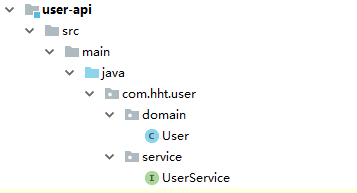Environment description: spring boot 2.0 + JDK1.8
Step 1: Build the eureka server, create a maven project, or directly idea or https://start.spring.io/ Quick creation pom.xml file
<?xml version="1.0" encoding="UTF-8"?> <project xmlns="http://maven.apache.org/POM/4.0.0" xmlns:xsi="http://www.w3.org/2001/XMLSchema-instance" xsi:schemaLocation="http://maven.apache.org/POM/4.0.0 http://maven.apache.org/xsd/maven-4.0.0.xsd"> <modelVersion>4.0.0</modelVersion> <parent> <groupId>org.springframework.boot</groupId> <artifactId>spring-boot-starter-parent</artifactId> <version>2.1.4.RELEASE</version> <relativePath/> <!-- lookup parent from repository --> </parent> <groupId>com.hht</groupId> <artifactId>eureka-server</artifactId> <version>0.0.1-SNAPSHOT</version> <name>eureka-server</name> <description>Demo project for Spring Boot</description> <properties> <java.version>1.8</java.version> <spring-cloud.version>Greenwich.SR1</spring-cloud.version> </properties> <dependencies> <dependency> <groupId>org.springframework.cloud</groupId> <artifactId>spring-cloud-starter-eureka-server</artifactId> </dependency> <dependency> <groupId>org.springframework.boot</groupId> <artifactId>spring-boot-starter-test</artifactId> <scope>test</scope> </dependency> </dependencies> <dependencyManagement> <dependencies> <dependency> <groupId>org.springframework.cloud</groupId> <artifactId>spring-cloud-dependencies</artifactId> <version>${spring-cloud.version}</version> <type>pom</type> <scope>import</scope> </dependency> </dependencies> </dependencyManagement> <build> <plugins> <plugin> <groupId>org.springframework.boot</groupId> <artifactId>spring-boot-maven-plugin</artifactId> </plugin> </plugins> </build> </project>
Startup class
package com.hht.eurekaserver; import org.springframework.boot.SpringApplication; import org.springframework.boot.autoconfigure.SpringBootApplication; import org.springframework.cloud.netflix.eureka.server.EnableEurekaServer; @SpringBootApplication @EnableEurekaServer public class EurekaServerApplication { public static void main(String[] args) { SpringApplication.run(EurekaServerApplication.class, args); } }
configuration file
spring.application.name=spring-cloud-eureka-server server.port=12345 eureka.client.register-with-eureka=false eureka.client.fetch-registry=false eureka.client.service-url.defaultZone=\ http://localhost:${server.port}/eureka
Note the single node situation:
eureka.client.register-with-eureka=false
eureka.client.fetch-registry=false
Access after successful startup http://localhost:12345/

The second step is to build the end part of eureka client, including service registration, discovery and use. The overall structure is as follows

user-api module is used to define interfaces

package com.hht.user.domain; /** * @author hht * @ClassName User * @Description TODO * @Date 2019/4/30 15:50 * @VERSION 1.0 */ public class User { private Long id; private String name; public Long getId() { return id; } public void setId(Long id) { this.id = id; } public String getName() { return name; } public void setName(String name) { this.name = name; } }
package com.hht.user.service; import com.hht.user.domain.User; import org.springframework.stereotype.Service; import java.util.Collection; public interface UserService { /** * Save user * * @param user * @return If the save is successful, return < code > true </code>. * Otherwise return < code > false </code > */ boolean save(User user); /** * Query all user objects * * @return Will not return < code > null </code > */ Collection<User> findAll(); }
user-service-consumer module is used to simulate service discovery and usage

pom.xml
<?xml version="1.0" encoding="UTF-8"?> <project xmlns="http://maven.apache.org/POM/4.0.0" xmlns:xsi="http://www.w3.org/2001/XMLSchema-instance" xsi:schemaLocation="http://maven.apache.org/POM/4.0.0 http://maven.apache.org/xsd/maven-4.0.0.xsd"> <parent> <artifactId>eureka-client</artifactId> <groupId>com.hht</groupId> <version>0.0.1-SNAPSHOT</version> </parent> <modelVersion>4.0.0</modelVersion> <artifactId>user-service-consumer</artifactId> <dependencies> <dependency> <groupId>com.hht</groupId> <artifactId>user-api</artifactId> <version>${project.version}</version> </dependency> <dependency> <groupId>org.springframework.boot</groupId> <artifactId>spring-boot-starter-web</artifactId> </dependency> <dependency> <groupId>org.springframework.cloud</groupId> <artifactId>spring-cloud-starter-netflix-eureka-client</artifactId> </dependency> </dependencies> </project>
# apply name spring.application.name=user-service-client server.port=8080 # Eureka server address eureka.client.serviceUrl.defaultZone= http://localhost:12345/eureka eureka.instance.prefer-ip-address=true eureka.instance.ip-address=192.168.1.160
@SpringBootApplication @EnableDiscoveryClient public class UserConsumerApplication { public static void main(String[] args) { SpringApplication.run(UserConsumerApplication.class,args); } }
Implement the interface class through restTemplate (experiment, general production environment has alternatives)
package com.hht.service; import com.hht.user.domain.User; import com.hht.user.service.UserService; import org.springframework.beans.factory.annotation.Autowired; import org.springframework.stereotype.Service; import org.springframework.web.client.RestTemplate; import java.util.Collection; /** * @author hht * @ClassName com.hht.service.UserServiceProxy * @Description TODO * @Date 2019/4/30 16:16 * @VERSION 1.0 */ @Service public class UserServiceProxy implements UserService { private static final String PROVIDER_SERVER_URL_PREFIX = "http://user-service-provider"; /** * Proxy to server provider through REST API */ @Autowired private RestTemplate restTemplate; @Override public boolean save(User user) { User returnValue = restTemplate.postForObject(PROVIDER_SERVER_URL_PREFIX + "/user/save", user, User.class); return returnValue != null; } @Override public Collection<User> findAll() { return restTemplate.getForObject(PROVIDER_SERVER_URL_PREFIX + "/user/list", Collection.class); } }
user-service-provider module is used to simulate service providers

pom.xml
<?xml version="1.0" encoding="UTF-8"?> <project xmlns="http://maven.apache.org/POM/4.0.0" xmlns:xsi="http://www.w3.org/2001/XMLSchema-instance" xsi:schemaLocation="http://maven.apache.org/POM/4.0.0 http://maven.apache.org/xsd/maven-4.0.0.xsd"> <parent> <artifactId>eureka-client</artifactId> <groupId>com.hht</groupId> <version>0.0.1-SNAPSHOT</version> </parent> <modelVersion>4.0.0</modelVersion> <artifactId>user-provider</artifactId> <dependencies> <dependency> <groupId>com.hht</groupId> <artifactId>user-api</artifactId> <version>${project.version}</version> </dependency> <dependency> <groupId>org.springframework.boot</groupId> <artifactId>spring-boot-starter-web</artifactId> </dependency> <dependency> <groupId>org.springframework</groupId> <artifactId>spring-web</artifactId> <version>5.1.9.RELEASE</version> <scope>compile</scope> </dependency> <dependency> <groupId>org.springframework</groupId> <artifactId>spring-web</artifactId> <version>5.1.9.RELEASE</version> <scope>compile</scope> </dependency> <dependency> <groupId>org.springframework.cloud</groupId> <artifactId>spring-cloud-starter-netflix-eureka-client</artifactId> </dependency> </dependencies> </project>
# apply name spring.application.name=user-service-provider # Eureka Client Port server.port=8081 # Eureka server address eureka.client.serviceUrl.defaultZone= http://localhost:12345/eureka eureka.instance.prefer-ip-address=true eureka.instance.ip-address=192.168.1.160
Interface Implementation Class, True Logic of Business
package com.hht.service; import com.hht.respository.UserRespository; import com.hht.user.domain.User; import com.hht.user.service.UserService; import org.springframework.beans.factory.annotation.Autowired; import org.springframework.stereotype.Service; import java.util.Collection; @Service public class UserServiceImpl implements UserService { @Autowired private UserRespository respository; @Override public boolean save(User user) { return respository.save(user); } @Override public Collection<User> findAll() { return respository.findAll(); } }
This concludes: The overall logic is that both client s are registered on the server side and invoke another service by accessing the service name + method Additional: General production environments require high availability Just modify the configuration file of eureka server and start more than one
eureka.client.register-with-eureka=false #Remove eureka.client.fetch-registry=false #Remove eureka.client.service-url.defaultZone=\ #Fill in the address of other server s except yourself http://localhost:${server.port}/eureka
Test code address: https://gitee.com/huhaitao/spring_cloud_test/tree/master/eureka